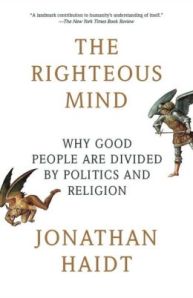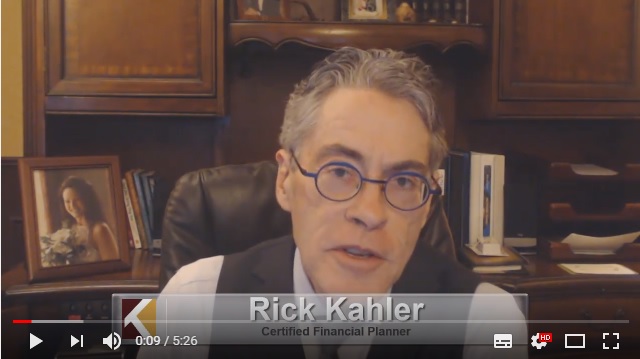The following blog is by Amy Jo Lauber originally published on her blog page.
Some years ago, while volunteering as a class instructor for Junior Achievement, I asked the students “Why is money important?” and the general response was “To help you fit in.” When I pressed on asking “Why is it important to fit in?” I was met by blank stares.
I originally translated those students’ stares to mean they didn’t have a reason. What I now realize is that they were wondering “What kind of weirdo doesn’t know why it’s important to fit in?”
I’m reading this phenomenal book, The Righteous Mind: Why Good People are Divided By Politics and Religion.
Haidt is a moral psychologist who studies why people do things, including judge others from a moral standpoint. His book confirms my previous suspicions that people need to be part of a social group and that all of their actions – including those involving money (work, education, charitable giving, investing, buying insurance, budgeting, income taxes) – are carefully orchestrated to the key of“Will this cause me to be favorably viewed by my group? Is this the right decision?”
Which group (or groups) you’re trying to fit into and impress affects your financial choices. You may be especially confused and challenged if you’re trying to fit into two different groups with two different (even conflicting) value systems (such as caution and entrepreneurship).
You may be especially confused and challenged if you’re trying to fit into two different groups with two different (even conflicting) value systems (such as caution and entrepreneurship).
Some groups value accomplishment, others value prudence/caution, and still others value consumerism (which is probably why so many people are deep in debt). These and other value systems direct our financial choices, possibly on a subconscious level.
I had an interesting conversation with Patricia Mancabelli, a business attorney who said that she counsels high school girls that “The single most important decision any young woman will make regarding success in any career is in choosing her significant other.” It is important to consider what that relationship can and will do to enhance or detract from your career.
The link between this conversation and the book I’m reading is the fact that marriage represents our future role in our society. The selection of a spouse is certainly partially romantic, but part of the selection is socially based (values, culture, and religion play a big role in “fitting in” and explains why wives around the globe are constantly kicking their husbands under the table) and no small amount of this decision is financially based because, while it’s unseemly to marry for money, “you can’t live on love.”
The romantic part is exempt in the case of arranged marriages, which are still the norm in India (which, along with other Eastern countries have cultures that are more group-focused versus Western countries that have more self-focused values systems). I don’t think arranged marriages are always a bad idea.
When I started dating my husband I told him he’d have to meet my parents and,
if they didn’t like him, I wouldn’t be seeing him again.
After many failed romances that I thought would lead to marriage, I knew that my radar was essentially broken and that my seeing-the-best-in-people personality didn’t lend itself to choosing a good partner.
But Mother’s always right. She and Dad loved my Paul and that gave me permission to fall in love with him, which I did on our 3rd date.
Women especially tend to derive their value from relationships, which makes them particularly susceptible to catty-ness (judging other women to boost their own rankings in the group) and challenged when it comes to asking for pay because asking for more money may make you look like a greedy you-know-what and then you won’t be accepted by the group.
Jonathan Haidt points out in The Righteous Mind “Anyone who values truth should stop worshipping reason.” Financial decisions are emotionally driven; we have such a strong urge and even need to be part of the group because otherwise how would we survive? (No one actually asks themselves this, at least not out loud.) We don’t need areason to feel this way; it is a truth.
As people become more and more financially affluent, they have the luxury of becoming more independent. This has led to multiple generations not living in one home as before (as was probably the norm throughout time) which has caused the need for child care, housekeeping services and care for the elderly, all of which cost even more money. (And causes many a beautiful neighborhood to fall into neglect as the money moves to a bigger house, with fewer people living in it, in a different area.) But on the bright side we don’t have to put up with each other’s idiosyncracies (a euphemism for B.S.).
But you know what? Americans, who possess more wealth per capita than any other people on the globe, are also becoming increasingly depressed. Why? We’ve traded much of the problems we experienced being part of an extended family for money and independence, which leads to isolation. And soon, without our group, life begins to lack meaning. This is a recipe for depression. My mother used to have a saying, “Aggravation is stimulation.” Like I said, she was always right.
From the article “Why is America so Depressed?“
“In a consumerist capitalist system, author David Korten (When Corporations Rule the World, Kumarian, 1996) points out, we are all caught to some degree in a downward spiral of deepening alienation: Our quest for money widens the gulf between ourselves and our families and communities. Our growing alienation then creates an inner sense of social and spiritual emptiness. That’s when advertisers get into the loop by assuring us that their products can make us whole again. We go out and buy their products, which requires money. And so we’re back at the beginning, the quest for money.”
I read posts and hear interviews all the time about how people who are dying regret not having been themselves, their authentic selves, that they somehow forsook their authenticity in favor of some homogenized version of themselves that was deemed acceptable (by the group). Here’s a great post about this topic from Ian Mitchell who focuses on a financial planning specialty called “Life Planning.”
So we can spout off adages such as Will Smith’s “Too many people spend money they haven’t earned, to buy things they don’t want, to impress people they don’t like,” and “like” people’s Facebook posts about not caring what other people think, but let’s be really honest with ourselves: We need to be liked, valued, respected and admired.
We need money; we need it to fit in.
About the author: My mission: I help people make good financial decisions with confidence. My purpose: I help people find peace with money. As President of Lauber Financial Planning, I provide financial advice, guidance and coaching on a fee only basis (no products, no commissions). I run a monthly support group called “I HATE Budgeting (But I Like Having Money)”, offer classes and seminars, speak around the world on the psychological, sociological, spiritual and emotional aspects of personal finance, and am the author of the ground-breaking book, “Living Inspired and Financially Empowered: Aligning Our Spiritual and Material Lives.”






0 Comments